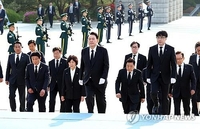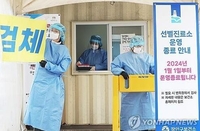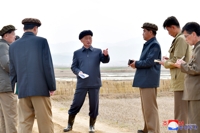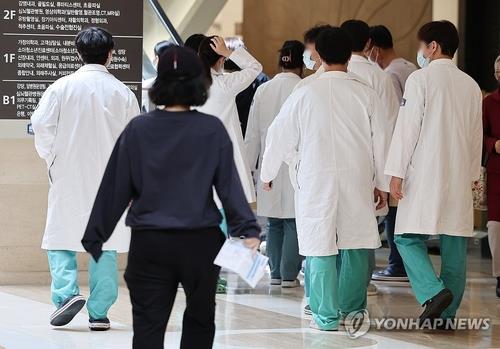(EDITORIAL from Korea Times on Oct. 21)
Nuclear power and cancer
A civil court in Busan has ruled that a nuclear power plant operator should be held accountable for a nearby resident contracting thyroid cancer. The ruling, the first of its kind in Korea and rare by international standards also, is expected to trigger an avalanche of similar lawsuits.
On Friday, the Eastern Busan District Court ordered Korea Hydro & Nuclear Power Co. (KHNP), the state-run operator of reactors, to pay 15 million won in compensation to a female resident, surnamed Park, who lived near the Gori nuclear power plant for nearly 20 years and eventually contracted cancer.
"The plaintiff is believed to have been exposed to radioactivity for a long time while living in a village about 10 kilometers away from the nuclear power plant. Although the radioactivity level emitted from the reactors is below the current standard of 0.25-1.00 milli-sievert, this is just a minimum guideline and therefore can't guarantee the absolute safety of residents,'' the ruling said.
The court, however, acknowledged that the awarding of only 15 million won in compensation out of the 200 million won demanded by the plaintiff was in recognition of KHNP's efforts to keep the radioactivity below the standard level. KHNP said it would appeal the decision, arguing that there is no causal relationship between radiation from the nuclear power plant and thyroid cancer.
The ruling carries great significance, given the fact the court admitted to the dangers of radioactivity for the first time that is not caused by a large accident at a nuclear plant. If the ruling is upheld by higher courts, the government's nuclear energy policy will have to undergo drastic changes.
First and foremost, it would be all but impossible to find new locations for nuclear power plants at a time when residents in candidate cities such as Samcheok and Yeongdeok have been voicing their opposition to nuclear energy. It's pretty obvious that their anti-nuclear movement will gather new impetus if it is legally verified that nuclear power is harmful to residents' health.
Given the global trend to curtail nuclear energy after the Fukushima meltdown, it may be desirable for Korea to reduce its dependence on nuclear power. This is not a realistic option for right now, however.
It's critical for the government to tighten the permissible radioactivity levels until the final ruling is made. Policymakers also need to be more prudent when deciding to extend the lifespan of worn-out atomic power plants.
What's urgently needed is to dispel fear among residents living near nuclear power plants. To this end, the government must launch a joint-survey team of officials and civilians to find out if the vicinity of atomic power plants is safe from radioactivity.
(END)
-
 Overdue debut of Korean abstract art pioneer Yoo Young-kuk at Venice Biennale
Overdue debut of Korean abstract art pioneer Yoo Young-kuk at Venice Biennale -
 Defense chief says N. Korea's hypersonic missile 'unsuccessful' in last-stage glide flight
Defense chief says N. Korea's hypersonic missile 'unsuccessful' in last-stage glide flight -
 Relax, immerse yourself in scents at Venice Biennale's Korean Pavilion
Relax, immerse yourself in scents at Venice Biennale's Korean Pavilion -
 N. Korea has capability to genetically engineer biological military products: U.S. report
N. Korea has capability to genetically engineer biological military products: U.S. report -
 S. Korea marks 30th anniv. of Korean Pavilion at Venice Biennale with contemporary art
S. Korea marks 30th anniv. of Korean Pavilion at Venice Biennale with contemporary art
-
 Overdue debut of Korean abstract art pioneer Yoo Young-kuk at Venice Biennale
Overdue debut of Korean abstract art pioneer Yoo Young-kuk at Venice Biennale -
 Relax, immerse yourself in scents at Venice Biennale's Korean Pavilion
Relax, immerse yourself in scents at Venice Biennale's Korean Pavilion -
 Artist Lee Bae captures ethereal Korean aesthetics at Venice Biennale
Artist Lee Bae captures ethereal Korean aesthetics at Venice Biennale -
 S. Korea marks 30th anniv. of Korean Pavilion at Venice Biennale with contemporary art
S. Korea marks 30th anniv. of Korean Pavilion at Venice Biennale with contemporary art -
 Defense chief says N. Korea's hypersonic missile 'unsuccessful' in last-stage glide flight
Defense chief says N. Korea's hypersonic missile 'unsuccessful' in last-stage glide flight
-
 Facebook page unveils photos of BTS member V in counter-terrorism unit gear
Facebook page unveils photos of BTS member V in counter-terrorism unit gear -
 Gov't likely to accept university chiefs' request to lower med school enrollment quota
Gov't likely to accept university chiefs' request to lower med school enrollment quota -
 S. Korea not invited to G7 summit meeting this year: sources
S. Korea not invited to G7 summit meeting this year: sources -
 Yoon's approval rating sinks to lowest point since taking office
Yoon's approval rating sinks to lowest point since taking office -
 S. Korea to fully shift to 'endemic' from COVID-19 pandemic starting next month
S. Korea to fully shift to 'endemic' from COVID-19 pandemic starting next month




















